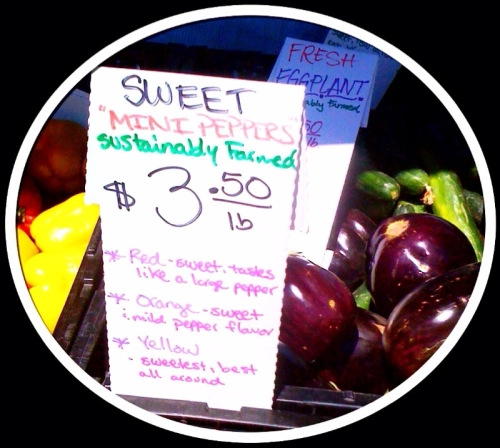“What does sustainably farmed mean?” I asked at the farmer’s market. The word sustainable is a word that is often thrown around to describe anything from food to underwear.
“Sustainably farmed means we don’t use chemicals when we don’t need to and use them when the conditions don’t allow for organic farming.”
“What do you mean ‘when the conditions don’t allow’,” I asked.
“Like if the weather is not good or if we get pests we use chemicals. It is difficult to grow good strawberries without pesticides, for example.” He pointed out the big beautiful strawberries on his table that were labeled sustainably farmed.
The definition of “sustainably farmed” didn’t sound much different from the description of conventional farming. A conventional wheat farmer shared with me that the conventional farmer doesn’t want to use more chemicals or fertilizers than they need to because it costs money. And if they don’t need to apply chemicals they won’t. “The stuff is expensive,” he said.
It is important to ask your food vendors questions. Ask what they mean when they throw words around like sustainable or all-natural. Be sure there definitions are in alignment with your own. The Sustainable Agriculture Research and Education (SARE) published a 12 page guide defining sustainable agriculture by profiling farms across the country. It is available for free as an online download.
These are questions I ask to find out if the food is sustainably-farmed. It is easier to get answers at a farmers market setting than in a grocery store. This is a good reason to get out the aisles of your grocery store into the the farmers market more often. BUT all food producers need to be asked these questions. Call your favorite producers or ask question on their Facebook pages.
- Is your farm organic or do you use organic ingredients (when it is a prepared food)?
If the answer is yes I move on to an irrigation question (see below). If the reply is no I move on to another vendor. If the answer is pesticide-free, I ask this follow-up question:
- That’s great your pesticide-free. Do you use organic soil or synthetic soils?
Organic certification requires organic soils. Non-organic, petroleum-based soils 1) do not absorb water as well as organic soils and 2) leech petroleum and chemicals into water systems.
Irrigation questions:
- How do you irrigate your crops?
Most farmer’s will be surprised by this question. Sometimes you will stump the vendor because they are not the farmer. When this happens, I asked if they can find out for me. The best answers are as follows:
- Dry-farmed/ rain-fed- this means that no irrigation was used. Read more here. Leafy greens and berries will rarely be found in this category. Some crops require the consistency of water provided through irrigation.
Forms of irrigation from the best to worst in water efficiency.
- Drip irrigation – BEST
- Sprinkler
- Flood- WORST
Five white canvas tents over from the ‘sustainably- farmed’ tent I found big, beautiful, sweet strawberries that were organic and irrigated with a drip-system. Those were the strawberries I took home with me.
Eat less water at your kitchen table!
Be well,
Florencia

click to Read & Leave a comment
Click to close comments
Comments